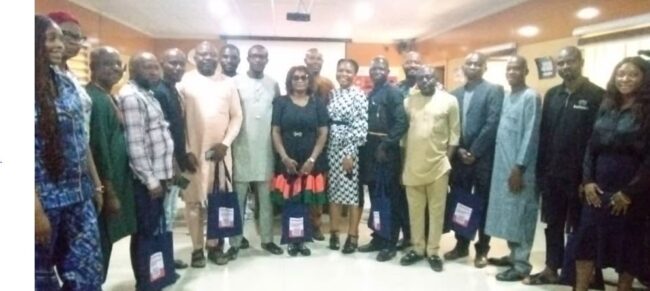ActionAid Nigeria has made a case for far-reaching reforms that would strengthen Nigeria’s electoral system.
These reforms by the Technical Working Group (TWG) of ActionAid Nigeria are part of the activities of the Citizens’ Led Engagements on Judicial Accountability in Post-Election Justice Delivery in Nigeria (CLEAP-Justice) project.
The reforms and advocacy policy by the TWG were presented to judiciary correspondents during an interactive meeting on Tuesday on the first phase of its CLEAP-Justice project.
In her opening remarks, the Coordinator of the ActionAid CLEAP-Justice Project, Adesuwa Iluobe, said the recommendations were made after an appraisal and review of some of the contentious judgements at the various election petition tribunals.
Also speaking, Oyin Bamigbaye, of ActionAid Nigeria, explained that the meeting was part of activities for the ongoing CLEAP-Justice Project.
Oyin hinted that the CLEAP-Justice Project is a citizen-centred and citizen-driven intervention that is designed to contribute to promoting accountability in post-election justice delivery in Nigeria.
After a cursory evaluation of the conduct of the 2023 general elections and post-election litigation, the group noticed the gaps within the Electoral Act, which necessitated reforms and policy advocacy by ActionAid Nigeria.
In view of the foregoing, ActionAid Nigeria advocated that pre-election matters should be determined before the election, with most matters (except presidential and gubernatorial elections) ending at the Court of Appeal, adding that the change aligns with constitutional provisions.
The group recommended that the levels of redress for pre-election matters should be reviewed, stressing that House of Representatives, Senate, and gubernatorial elections should have two steps/levels ending at the Court of Appeal, while presidential pre-election matters should start and end at the Supreme Court.
ActionAid demanded that breaches of election regulations or guidelines should lead to disqualification, which should be applied as a remedy for offences with criminal elements as per Nigerian law, emphasising the distinction between civil and criminal violations.
The TWG advocated that primaries not conducted in adherence to INEC guidelines should be invalidated, noting that stringent rules and sanctions should deter elevated electoral crimes, and parties should be prohibited from holding public office for five years in case of disqualification.
“The punishment for electoral offences in the Electoral Act should be revised to elevate intrinsic offences to a level that disqualifies parties from elections.”.
In addition, the group recommended that the National Judicial Council (NJC) should be more proactive in the discipline of judges who misuse ex-parte orders and that such judges should not be appointed to election tribunals.
“Making disciplinary reports public would deter judges from compromised actions, as they would be aware of the potential public scrutiny.
“INEC should develop more detailed guidelines for using the seven-day window to renew the declaration and return, as provided in Section 65(1) of the Electoral Act and Clause 99 of the INEC Regulations and Guidelines for the Conduct of Elections 2022 to ensure transparency in such a review process.
“INEC should cease to be a statutory respondent in election petitions. Its role should be limited to tendering all relevant documents and providing clear explanations of their purpose and origin,” the TWG recommended.
The TWG of the CLEAP-Justice Project chaired by Prof. A. Owoade resolved that the Constitution should be amended to the effect that election litigations for HOR, Senate, and gubernatorial elections should be two levels, ending at the Court of Appeal, with three-panel members at the lower court and five at the Court of Appeal.
The group also called for the inclusion of independent experts on elections in each tribunal to provide opinions, adding that INEC regulations and guidelines should be made binding.
“In order to ensure completion of election petitions before swearing-in, there should be shorter timelines for election petitions from 180 days to maximum of 120 days or 60 days at each level”, the TWG advocated and added that enhanced objectivity and transparency should be introduced in the appointment of judges, stressing that the process applied by the NJC should include citizens’ scrutiny of proposed appointees.
“Collaboration with identified incorruptible judges should be pursued and comprehensive security and welfare provided to help them withstand extreme pressure.
“The establishment of an online platform is needed for citizens to report judicial misconduct or blow the whistle on judges and court proceedings.
“The position of the Chief Justice of Nigeria (CJN) should be unbundled to reduce the concentration of power and promote transparency. There should be deputies to all heads of courts, with their roles and responsibilities clearly defined,” the group demanded, among others.
ALSO READ THESE TOP STORIES FROM NIGERIAN TRIBUNE
